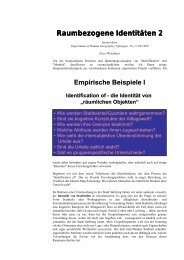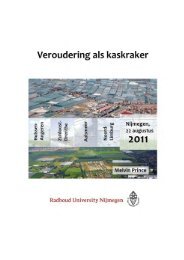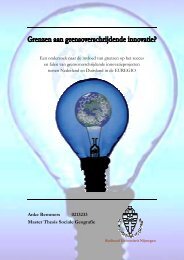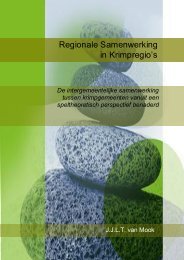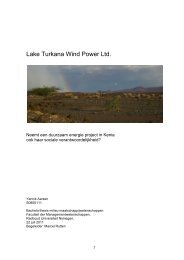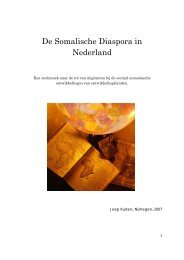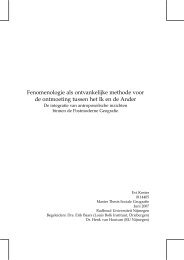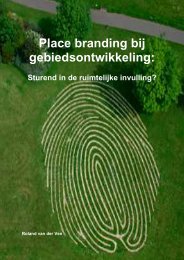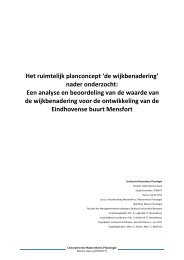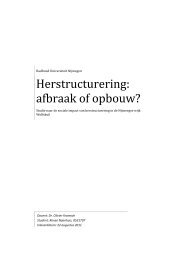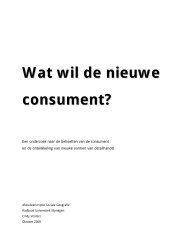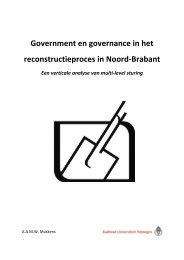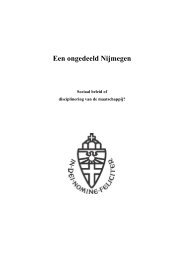Trading with the enemy in Mitrovica, Kosovo. - RUhosting
Trading with the enemy in Mitrovica, Kosovo. - RUhosting
Trading with the enemy in Mitrovica, Kosovo. - RUhosting
You also want an ePaper? Increase the reach of your titles
YUMPU automatically turns print PDFs into web optimized ePapers that Google loves.
CHAPTER 1: INTRODUCTION<br />
“Sixteen years,<br />
Sixteen banners united over <strong>the</strong> field<br />
Where <strong>the</strong> good shepherd grieves.<br />
Desperate men, desperate women divided,<br />
Spread<strong>in</strong>g <strong>the</strong>ir w<strong>in</strong>gs 'neath <strong>the</strong> fall<strong>in</strong>g leaves.<br />
Fortune calls.<br />
I stepped forth from <strong>the</strong> shadows to <strong>the</strong> marketplace”.<br />
-Bob Dylan, Chang<strong>in</strong>g of <strong>the</strong> Guards.<br />
For <strong>the</strong> past 600 years Albanians and Serbs have lived toge<strong>the</strong>r <strong>in</strong> <strong>Kosovo</strong>. Most of this shared history <strong>the</strong>re<br />
were no issues between <strong>the</strong>m, and historically it's sometimes hard to dist<strong>in</strong>guish between <strong>the</strong>m despite <strong>the</strong>ir<br />
different ethnicity, language and partly <strong>the</strong>ir religion. This has changed. When Yugoslavia's economy started<br />
to fail <strong>in</strong> <strong>the</strong> 1970's ethnic tensions slowly started to rise. This started <strong>in</strong> <strong>Kosovo</strong> – Yugoslavia's poorest<br />
region, lead<strong>in</strong>g to stronger segregation and later to civil war. <strong>Mitrovica</strong>, a city <strong>in</strong> <strong>the</strong> nor<strong>the</strong>rn part of <strong>Kosovo</strong><br />
located exactly on <strong>the</strong> river Ibar became a conflict hot spot. Although <strong>Mitrovica</strong> was a mixed city before <strong>the</strong><br />
war, after <strong>the</strong> war it became a divided one <strong>with</strong> Albanians liv<strong>in</strong>g <strong>in</strong> <strong>the</strong> part south of <strong>the</strong> river Ibar and Serbs<br />
liv<strong>in</strong>g <strong>in</strong> <strong>the</strong> north part. This division is nowadays a characteristic of <strong>Kosovo</strong>: <strong>the</strong>re is no contact between<br />
Albanians and Serbs any more. <strong>Mitrovica</strong> became a magnify<strong>in</strong>g glass for <strong>the</strong> <strong>Kosovo</strong> conflict, as it is known<br />
as <strong>the</strong> place where most of <strong>the</strong> <strong>in</strong>ter-ethnic violence happens. Lately, <strong>Mitrovica</strong> also became known for<br />
someth<strong>in</strong>g else: <strong>in</strong>ter-ethnic trade. In a society where people not only do not want <strong>in</strong>ter-ethnic contact but are<br />
also punished by <strong>the</strong>ir own community for engag<strong>in</strong>g <strong>in</strong>to contact <strong>with</strong> “<strong>the</strong> o<strong>the</strong>r”, money seems to be <strong>the</strong><br />
only th<strong>in</strong>g that can lure people out of <strong>the</strong>ir fortifications. These relations between Albanians and Serbs <strong>in</strong><br />
<strong>Mitrovica</strong> and how <strong>the</strong>y can be <strong>in</strong>fluenced by <strong>in</strong>ter-ethnic trade are <strong>the</strong> topic of this <strong>the</strong>sis.<br />
The idea that “trade br<strong>in</strong>gs peace” is not new. Some people date it back to <strong>the</strong> ancient Greeks, while o<strong>the</strong>r<br />
po<strong>in</strong>t at Immanuel Kant or Adam Smith as its source. By now <strong>the</strong> <strong>the</strong>ory – referr<strong>in</strong>g to trade and relations<br />
between states - has accumulated a wealth of data <strong>in</strong> favour of its claim, although <strong>the</strong>re are also critics of it.<br />
Perhaps more importantly, this liberal <strong>the</strong>ory has <strong>in</strong>fluenced western policy makers who pursued better<br />
relations <strong>with</strong> o<strong>the</strong>r states strongly s<strong>in</strong>ce <strong>the</strong> end of <strong>the</strong> Second World War. It has even on occasion<br />
<strong>in</strong>fluenced western policy makers <strong>in</strong> <strong>the</strong> Balkans who tried to achieve better relations between <strong>the</strong> different<br />
ethnic groups after <strong>the</strong> violent conflicts of <strong>the</strong> 90s (Andreas, 2004). This may be a bit premature s<strong>in</strong>ce no<br />
research has been conducted yet on <strong>the</strong> pacify<strong>in</strong>g effect of trade on relations between <strong>in</strong>ter-ethnic groups.<br />
There may be a huge amount of research and analysis' conducted on <strong>the</strong> “trade br<strong>in</strong>gs peace” <strong>the</strong>ory, but this<br />
was all aimed at relations between states, never between ethnic groups. S<strong>in</strong>ce so little is known so far, this<br />
research will have a more exploratory character.<br />
The specific context of this study is <strong>Kosovo</strong>'s divided town <strong>Mitrovica</strong>, located <strong>in</strong> nor<strong>the</strong>rn <strong>Kosovo</strong>. <strong>Mitrovica</strong><br />
is a complex city where every-day life is shaped by politics and <strong>in</strong>ter-ethnic relations. Most people's ma<strong>in</strong><br />
4



